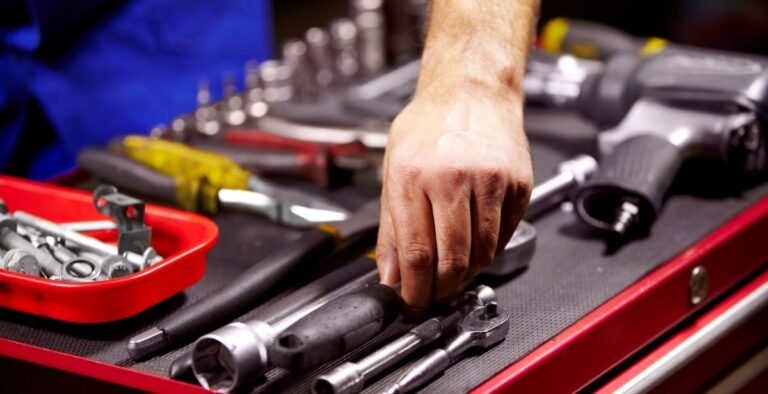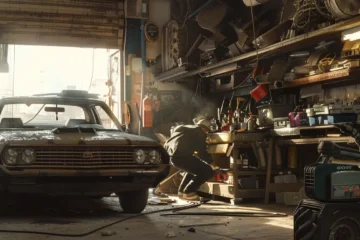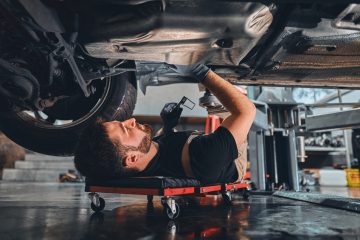Hey there, fellow gearheads! If you’re a mobile mechanic or thinking about becoming one, you’re in for a treat. Today, we’re diving deep into the world of mobile mechanic tools. Trust me, having the right tools can make or break your business. So, let’s get our hands dirty and explore the must-have tools that’ll keep you rolling smoothly.
Why Having the Right Tools Matters
Before we jump in, let’s talk about why having the right tools is so crucial. As a mobile mechanic, you’re often working in tight spots, unfamiliar environments, and sometimes even in less-than-ideal weather conditions. The right tools can help you:
- Work faster and more efficiently
- Tackle a wider range of repairs
- Impress your clients with your professionalism
- Stay safe on the job
Now, let’s get to the good stuff!
1. Socket Set: Your Go-To for Nuts and Bolts
A solid socket set is like the Swiss Army knife of the mechanic world. You’ll use it for everything from oil changes to major engine work. Here’s what to look for:
- Both metric and standard sizes
- Deep sockets for those hard-to-reach spots
- A sturdy ratchet with a comfortable grip
- Extensions for extra reach
Pro tip: Invest in a set with color-coded sockets. It’ll save you time when you’re elbow-deep in an engine bay.
2. Wrenches: When Sockets Just Won’t Cut It
While sockets are great, sometimes you need the finesse of a good wrench set. Look for:
- Combination wrenches (one end open, one end boxed)
- Adjustable wrenches for those odd-sized bolts
- Ratcheting wrenches for speedier work
Remember, quality matters here. Cheap wrenches can round off bolt heads, turning a simple job into a nightmare.
3. Jack and Jack Stands: Lift with Confidence
Safety first, folks! A reliable jack and sturdy jack stands are non-negotiable. Here’s what you need:
- A hydraulic floor jack with at least a 3-ton capacity
- Jack stands rated for the vehicles you typically work on
- A set of wheel chocks for extra safety
Never, and I mean never, work under a vehicle supported only by a jack. Always use jack stands!
4. Screwdrivers: Not Just for Screws
A good set of screwdrivers will come in handy more often than you might think. Look for:
- Both flathead and Phillips head in various sizes
- Insulated handles for electrical work
- A magnetic tip for those pesky dropped screws
Bonus points if you snag a set with interchangeable bits. It’ll save space in your toolbox.
5. Pliers: Grip, Twist, and Cut
Pliers are the unsung heroes of any toolbox. Make sure you have:
- Needle-nose pliers for precision work
- Channel-lock pliers for pipes and fittings
- Wire cutters for electrical repairs
I once used needle-nose pliers to fish out a dropped bolt from behind an engine block. Trust me, you’ll find uses for these you never imagined.
6. Torque Wrench: Precision Matters
When it comes to critical fasteners, guessing isn’t good enough. A torque wrench ensures everything’s tightened just right. Look for:
- A click-type torque wrench for ease of use
- A range that covers most automotive applications (usually 20-150 ft-lbs)
- A case for proper storage (these tools need TLC)
Remember to get it calibrated regularly. An out-of-whack torque wrench is worse than no torque wrench at all.
7. Scan Tool: Speak the Car’s Language
Modern cars are basically computers on wheels. A good scan tool helps you decipher what’s going on under the hood. Consider:
- OBD-II compatibility for all cars made after 1996
- Live data streaming capabilities
- Regular software updates to keep up with new vehicle models
I once had a customer swear up and down that their engine was about to explode. Turns out, it was just a loose gas cap setting off the check engine light. The scan tool saved the day (and saved my customer a lot of worry).
8. Multimeter: Your Electrical Detective
Electrical issues can be tricky, but a multimeter makes them manageable. Look for one that can measure:
- Voltage (AC and DC)
- Resistance
- Continuity
Bonus points if it has a built-in amp clamp for measuring current without breaking the circuit.
9. Oil Change Kit: Clean and Green
Oil changes are bread and butter for many mobile mechanics. Here’s what you need:
- A large drain pan (at least 16 quarts for bigger vehicles)
- Funnel set for mess-free refills
- Oil filter wrench (both strap and cup style)
Pro tip: Invest in a pump to transfer used oil to storage containers. It’ll keep your workspace clean and make disposal easier.
10. Flashlight and Work Light: See the Light
You can’t fix what you can’t see. A good lighting setup is crucial. Consider:
- A powerful handheld flashlight (500+ lumens)
- A rechargeable work light with adjustable stand
- A headlamp for hands-free illumination
I once tried to diagnose a strange noise using just my phone’s flashlight. Never again. Good lighting is worth its weight in gold.
11. Battery Tools: Power Up
Dead batteries are a common call for mobile mechanics. Be prepared with:
- A battery tester to diagnose issues
- Jumper cables (heavy-duty ones)
- A portable jump starter for when there’s no other car around
These tools can turn you into a neighborhood hero during those cold winter mornings.
12. Compression Tester: Peek Inside the Engine
A compression tester helps you diagnose internal engine problems without tearing everything apart. It’s a real time-saver for:
- Checking for worn piston rings
- Identifying leaky valves
- Spotting head gasket issues
Just be sure to get one with adapters for different spark plug sizes.
13. Brake Tools: Stop the Madness
Brake jobs are common, so be ready with:
- Brake caliper tool set for pistons
- Brake bleeding kit (consider a pressure bleeder for one-person jobs)
- Brake pad spreader
Safety tip: Always wear a mask when working on brakes. That dust is nasty stuff.
14. Fluid Transfer Pump: No Spills, No Mess
Whether it’s coolant, power steering fluid, or differential oil, a good transfer pump makes fluid exchanges a breeze. Look for:
- Manual and electric options
- Different sized tubes for various applications
- Easy-to-clean design
Trust me, your back will thank you for not having to lift those heavy fluid jugs.
15. Cordless Impact Wrench: Power When You Need It
For stubborn bolts and quick wheel changes, a cordless impact wrench is a game-changer. Consider:
- At least 18V for decent power
- Multiple batteries for all-day use
- A kit with varying socket sizes
Just remember, with great power comes great responsibility. Don’t over-torque those lug nuts!
16. Coolant System Tester: Under Pressure
Coolant system issues can be tricky to diagnose. A pressure tester helps you:
- Find leaks in hoses, radiators, and water pumps
- Test radiator caps
- Refill and bleed cooling systems
It’s a specialized tool, but it’ll pay for itself the first time you quickly diagnose a coolant leak.
17. Telescoping Magnetic Pickup Tool: Your Rescuer
We’ve all been there – that bolt rolls into the abyss of the engine bay. A telescoping magnetic pickup tool is your best friend in these situations. Get one with:
- Strong magnet
- Flexible shaft for tight spaces
- LED light on the end for visibility
I once retrieved a wedding ring that fell into an engine bay with one of these. Talk about a happy customer!
18. Digital Tire Pressure Gauge: Precision Matters
Proper tire pressure is crucial for safety and fuel efficiency. A good digital gauge offers:
- Accurate readings
- Easy-to-read display
- Multiple units (PSI, BAR, kPa)
Bonus: Pair this with a portable air compressor, and you’ve got a mobile tire service station.
19. Fuel Pressure Tester: Diagnose the Flow
Fuel system issues can be tricky. A fuel pressure tester helps you:
- Check for proper fuel pressure
- Identify weak fuel pumps
- Diagnose clogged fuel filters
Just be careful – fuel is flammable, so always follow proper safety procedures.
20. Borescope: See the Unseeable
A borescope or inspection camera can be a lifesaver for diagnosing issues in hard-to-reach places. Look for:
- Flexible, waterproof cable
- LED lighting
- Wireless connectivity to your smartphone
I once used one to find a mouse nest in a customer’s HVAC system. You never know what you might discover!
21. Toolbox: Keep It All Together
Last but not least, you need a way to organize and transport all these tools. A good toolbox should be:
- Sturdy and weather-resistant
- Easy to organize with multiple compartments
- Lockable for security
Consider a rolling toolbox for easier transport, especially if you’re working solo.
Real-Life Success Story
Let me tell you about Mike from Phoenix, Arizona. He started his mobile mechanic business with just a basic set of tools. After investing in a high-quality scan tool and a cordless impact wrench, he was able to take on more complex jobs and work faster. Within six months, he doubled his client base and increased his earnings by 50%. The right tools made all the difference for Mike’s business.
FAQs
Q: Do I really need all these tools to start as a mobile mechanic?
A: Not necessarily. Start with the basics (sockets, wrenches, jack, etc.) and add specialized tools as you expand your services.
Q: How much should I budget for tools?
A: It varies, but expect to invest $2,000-$5,000 for a good starter set. Quality tools are an investment in your business.
Q: Are battery-powered tools reliable enough for professional use?
A: Absolutely! Modern battery tech has come a long way. Many pros now swear by their cordless tools.
Q: How often should I replace my tools?
A: Quality tools can last years with proper care. Replace them when they show signs of wear or damage.
Q: Can I use my personal vehicle to transport all these tools?
A: It’s possible, but a dedicated work van or truck is more practical and professional-looking.
Q: How do I keep my tools organized on the go?
A: Invest in a good toolbox with compartments, and consider using foam inserts to keep everything in place.
Wrapping It Up
There you have it, folks – the essential tools every mobile mechanic needs to succeed. Remember, your tools are an investment in your business and your reputation. Start with the basics and build your collection as you grow.
Quality matters, but you don’t need to break the bank right away. Focus on the tools you’ll use most often, and add specialized equipment as you need it.
And hey, don’t forget the most important tool of all – your knowledge and experience. Keep learning, stay curious, and never stop improving your skills.
Now get out there and show those cars who’s boss! Happy wrenching!




